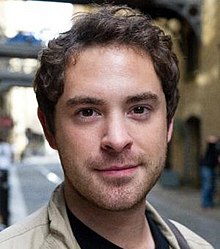Brian Earp
Dr Brian David Earp | |
|---|---|
 Brian in front of the Bridge of Sighs | |
| Born | 1985 |
| Occupation | Philosopher, Cognitive Scientist, Bioethicist |
| Education | Yale University, University of Oxford, University of Cambridge |
| Notable works | Love Drugs: The Chemical Future of Relationships |
| Notable awards | 2020 John Maddox Prize for “standing up for science” |
| Website | |
| www | |
Brian David Earp is an
Earp has written on a wide range of topics, including free will,[3] sex and gender[4] and the replication crisis in psychology[5] He currently writes the quarterly "Philosophy in the Real World" column for The Philosopher. In 2019, Earp wrote his first book (co-written with Julian Savulescu), published in the UK as Love Is the Drug: The Chemical Future of Our Relationships [6] and in the United States as Love Drugs: The Chemical Future of Relationships).[7][8][9][10][11]
Personal life
Earp grew up in a conservative evangelical Christian household. His mother was a stay-at-home mother; his father was a X-ray technician.[10]
Work and views
Relationships and drugs
He is best known for writing Love Is the Drug: The Chemical Future of Our Relationships with Julian Savulescu.[10][12][13] He has argued that certain forms of medications can be ethically consumed as a "helpful complement" in relationships. Both to fall in love, and, to fall out of it.[10][11]
Circumcision and intersex medical interventions
Earp has argued that all forms of involuntary non-therapeutic genital modification and mutilation — including routine neonatal circumcision, intersex interventions, and female genital mutilation — are violations of bioethical principles.[1][2][14][15] For this work, Earp was nominated for the 2020 John Maddox Prize, and received commendation from the judges, for “taking a multi-disciplined, science-based approach to a deep-rooted cultural practice”.[16]
Bibliography
- Earp, Brian D.; Savulescu, Brian D. (2020). Love is the Drug: The Chemical Future of Our Relationships. ISBN 978-1-5261-4541-3.
- Earp, Brian D.; Chambers, Clare; Watson, Lori, eds. (2022). The Routledge Handbook of Philosophy of Sex and Sexuality. ISBN 9781138370678.
References
- ^ a b Earp, Brian D.; Steinfeld, Rebecca (May 15, 2017). "How different are female, male and intersex genital cutting?". The Conversation. Archived from the original on 2017-05-16. Retrieved October 29, 2020.
- ^ ISSN 2230-2468.
- .
- ^ Earp, Brian D. (2020). "What is gender for?". The Philosopher. 108 (2): 94–99 – via ResearchGate.
- PMID 26042061.
- ^ "Manchester University Press - Love is the Drug". Manchester University Press. Retrieved 2020-12-07.
- ISBN 9780804798198. Retrieved 2020-12-07.
- Politifact. Archivedfrom the original on 2020-10-28. Retrieved 2020-10-25.
- ^ Zublin, Fiona (2020-01-05). "Love in the Roaring '20s". OZY. Archived from the original on 2020-01-06. Retrieved 2020-10-25.
- ^ a b c d Shane, Cari (2019-12-12). "Can We Replace Couples Therapy With Real-Life Love Potions?". OZY. Archived from the original on 2019-12-13. Retrieved 2020-10-25.
- ^ a b Szalavitz, Maia (2014-05-19). "Is It Possible to Create an Anti-Love Drug?". The Cut. Archived from the original on 2018-04-17. Retrieved 2020-10-29.
- ^ Fetters, Ashley (2020-01-16). "Your Chemical Romance". The Atlantic. Retrieved 2020-10-25.
- ^ Anekwe, Lilian (February 12, 2020). "Drugs may be able to fix our romantic lives when things go wrong". New Scientist. Archived from the original on 2020-02-13. Retrieved 2020-10-29.
- ISBN 978-1316508213.
- S2CID 44291019.
- ^ CAPRISA (Dec 14, 2020). "Anthony Fauci and Salim Abdool Karim jointly awarded John Maddox Prize 2020 for standing up for science during the coronavirus pandemic".
